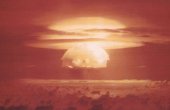What Public Opinion Says About the Use of Nuclear Weapons

There is a hard-fought and critical debate about whether or not there is a norm against the use of nuclear weapons. A nuclear war could lead to the end of life as we know it on a global scale. If humans believe that nuclear weapons should not be used, then we can have some confidence that humans are unlikely to use them. If, however, there is not a norm against their use, we cannot be confident that the U.S. nuclear bombing of Hiroshima and Nagasaki in Japan will remain the world’s only case of a nuclear attack.

With the return of great power rivalry, the Russo-Ukrainian war, and President Vladimir Putin’s and former President Donald Trump’s threats of nuclear use, the matter of nuclear norms is highly salient. Norms identify standards of appropriate behavior. In the case of nuclear weapons, we might think of there being a tradition against their use. A taboo against nuclear use is even stronger than a norm; it is an unconditional proscription. Violators of a taboo are seen as morally loathsome.
The study of nuclear norms often includes examination of the views of policymakers or individuals as a group. Depending on what questions a survey asks and how the questions are phrased, the research might find that the public is strongly against the use of nuclear weapons. The U.S. public is widely assumed to believe that nuclear weapons use is bad. But new research by Joshua Schwartz, an assistant professor at the Carnegie Mellon Institute for Strategy & Technology, finds high support for their use, even when foreign countries press the nuclear “button.”
Could you tell us briefly why your article matters?
My article analyzes the extent to which public opinion might constrain leaders from using — or enable leaders to use — nuclear weapons. Like global pandemics, nuclear weapons use is a high-impact but low-probability event. It is low probability in the sense that states have strong incentives not to use nuclear weapons, which can help explain why they (thankfully) have not been used for almost 80 years. It is high impact in the sense that the use of even a single modern nuclear weapon could cause unthinkable devastation.
Worryingly, there are signs the risk of nuclear use has increased in recent years. Vladimir Putin has issued nuclear threats in the context of the Russo-Ukraine War. As president, Donald Trump publicly warned North Korea of possible U.S. nuclear use (the infamous “fire and fury” threat) and privately discussed the use of nuclear weapons with his advisors. China is engaged in a large-scale nuclear buildup that will see its arsenal double by 2030. Cold War-era nuclear arms control agreements between the United States and Russia, such as the New START and Intermediate-Range Nuclear Forces Treaties, have collapsed or are near collapse. Consequently, how the public views the use of nuclear weapons is an important question.
What is the conventional wisdom on public opinion about nuclear weapons?
The conventional wisdom is that foreign audiences in particular would condemn the use of nuclear weapons by the United States. For example, Secretary of State John Foster Dulles argued that using nuclear weapons in response to a Soviet blockade on Berlin in 1948 “would surely cost us our allies” and “we’d be finished as far as present-day world opinion was concerned.” Regarding the possibility of using nuclear weapons in Vietnam, President Richard Nixon said that doing so would have resulted in “domestic and international uproar [that] would have damaged our foreign policy on all fronts.” General Matthew Ridgway, who became Supreme Allied Commander in Europe and the U.S. Army chief of staff, argued that using nuclear weapons “would so revolt free world opinion as to leave us, quite possibly, friendless and isolated in a hostile world.”
Related Article
In general, many scholars argue that there is a strong norm, tradition, or even taboo against the use of nuclear weapons. Because of the unique scale and speed at which nuclear weapons can inflict destruction, policymakers and the public may view their use as fundamentally inappropriate. The best evidence for this position is that nuclear weapons have not been used since 1945, even against countries that could not threaten nuclear retaliation themselves. If nuclear deterrence does not explain historical non-use, then perhaps a norm against nuclear use can.
How does your research differ from previous studies on public opinion about nuclear weapons?
Scholars have asked whether the public would support the use of nuclear weapons by their own government. Surveys conducted in the United States, China, and other major powers indicate that a majority or near-majority of the public would support the use of nuclear weapons by their own country if doing so would enhance military effectiveness or save the lives of co-national soldiers. My article takes a different approach. I ask whether the public would support the use of nuclear weapons by a foreign government.
What are your main findings?
Surprisingly, my research finds high support for hypothetical nuclear use, even when foreign countries press the nuclear “button.” In four survey experiments involving members of the public in the United States and India, support for hypothetical nuclear use is the same when an individual’s own country hypothetically uses nuclear weapons as when a foreign allied or partner country hypothetically uses nuclear weapons. For example, in one study on the U.S. public, support for a hypothetical nuclear attack against Iran was no different when Israel carried it out compared to the United States. Overall, I found that the use of nuclear weapons is not taboo in the United States and India. But support is lower when the public considers a non-allied or non-partner country’s hypothetical use of nuclear weapons.
The use of violence by in-group members is likely to be seen as more ethical and receive greater levels of support than the use of violence by out-group members.
The key to understanding these findings is the concept of in-groups and out-groups. In-group bias means that individuals are more likely to favor members of their own group (“us”) than members of other groups (“them”). In-groups are based on an understanding of a shared attribute. National identification is one of the most powerful shared attributes making up an individual’s identity. Other shared attributes — such as values, ideologies, and interests — can also shape perceptions of us versus them. Individuals may view allied and partner countries as part of their in-group because they share values, ideologies, and interests with an individual’s own country. For example, U.S. citizens may consider formally allied countries (e.g., NATO members like France) and more informal partners (e.g., Israel, which does not have a formal defense agreement with the United States) as part of their in-group.
Per “virtuous violence theory” (VVT) in psychology, the use of violence by in-group members is likely to be seen as more ethical and receive greater levels of support than the use of violence by out-group members because humans value unity within their in-group. All of this suggests that when in-group countries use nuclear weapons, support may be higher than the conventional wisdom suggests.
Can you say more about VVT?
VVT maintains that people typically engage in or support violence because they believe that it is moral — or “virtuous” — to do so. In other words, people view it as the right thing to do even if they do not inherently enjoy committing or observing violence. People believe that resorting to violence is sometimes the right thing to do because the use of or support for violence can help create, maintain, or enhance social relationships. For example, most would agree that using violence to protect your own child against the threat of an armed home invader is moral.
According to the VVT framework, an in-group member’s use of violence to protect the larger group against a threat is likely to be perceived as a virtuous action that reinforces collective responsibility and outcomes. In contrast, an out-group member’s use of violence will be viewed as less virtuous because the moral imperative of unity will not be at play. This difference reflects in-group bias.
Tell us more about how you conducted your research and what you found.
In the surveys, I presented respondents with hypothetical scenarios in which a country might consider using nuclear weapons (e.g., in a war with Iran or against a terrorist group with a deeply buried nuclear weapons lab). I then randomly varied the country hypothetically using nuclear weapons in the surveys. For the studies on the U.S. public, the possibilities included the United States (an individual’s own country), France (a treaty ally), Israel (a close partner), Pakistan (a “frenemy”), and Russia (a current adversary and clear out-group country). Besides the country carrying out the hypothetical nuclear strike, all the other details of the scenario were the same.
The results were striking. Contrary to the conventional wisdom, U.S. public support did not drop when France or Israel carried out a hypothetical nuclear attack compared to when the United States did so. Absolute levels of support for nuclear use were also high, with a majority or near-majority approving of a hypothetical nuclear attack by the United States, France, or Israel. The findings related to the scenario about Iran were particularly sobering, as that hypothetical involved intentionally attacking 100,000 Iranian civilians with nuclear weapons.
Although U.S. public support was lower for a hypothetical Pakistani or Russian nuclear strike than for a hypothetical U.S. strike, about two-fifths of respondents still supported it.
Essentially identical results held among the Indian public. Support for a nuclear strike by the United States (a strategic partner of India’s) was not lower than support for a nuclear attack by the Indian government. On the other hand, support was significantly less for a nuclear strike by Pakistan (a clear enemy of India’s). Absolute levels of support were again high, with a majority supporting a nuclear strike by India and the United States, and over one-third of respondents supporting a nuclear attack by Pakistan.
Overall, nuclear use seems far from unthinkable for many members of U.S. and Indian publics, even when foreign countries are the attackers. Public opinion opposing nuclear use may thus be less restrictive for policymakers than previously thought.
Jacqueline L. Hazelton is the executive editor of the journal International Security.
Joshua A. Schwartz is an assistant professor at the Carnegie Mellon Institute for Strategy & Technology (CMIST). His article “When Foreign Countries Push The Button: Public Support for Foreign Nuclear Use” appears in the Spring 2024 issue of International Security.




